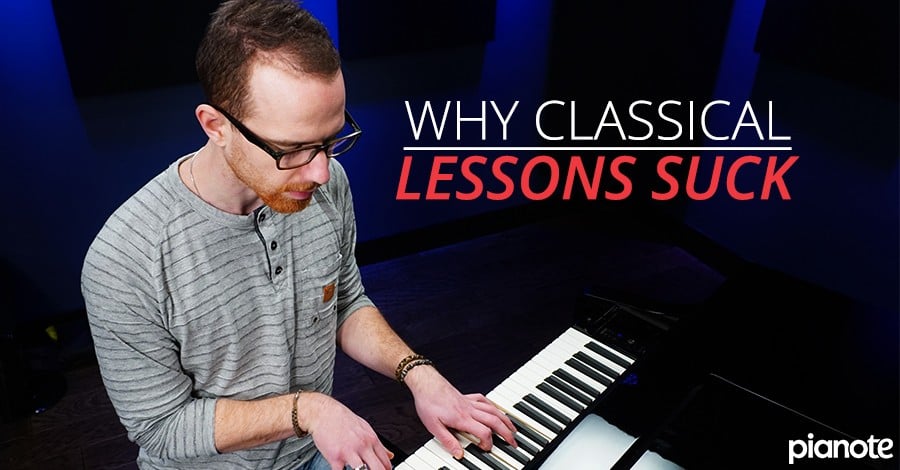
I have a confession to make. I still hate sheet music. After all these years, I still hit that creative wall when confronted with a page full of little dots and weird symbols. How do you take that and make real music out of it?
My first foray into the piano was via classical music lessons. Those lessons gave me the foundation of solid technique, theory and sight-reading ability that any musician needs to get good at their instrument. I spent hours memorizing the acronyms and the crazy latin terminology.
I drilled chord inversions and Hanon exercises. I learned some incredibly important skills from the classical music world, skills that are essential for any good player to know. And I still dragged my feet before every lesson.

Practice sessions were a slog, and here’s why: I was mostly afraid to make mistakes or play something ‘wrong.’ I didn’t feel like I could take chances at the keyboard. Despite the benefits of all this classical knowledge, I still couldn’t get past this hunch that there was something deeper at the core of every musician, and that playing could be not only challenging but also fun, expressive, and rewarding.
What I didn’t realize is that rather than using this classical training to enhance my ability, I was using it to limit what I felt I could do as a piano player. This is a trap that a lot of musicians can fall into without even realizing it. We look at notes written on a page and automatically assume that anything that isn’t those notes are the ‘wrong’ ones.
Now, before you go and throw those books away, I’m not telling you to forget your training and give up practice. Anything but. After all, the development and upkeep of good technique is essential to any good musician. Instead, what I’m telling you to do is trust your training enough to not have to think about it all the time.
Give yourself moments to just let your mind wander on the keys, free from any idea of mistakes or good/bad notes. Trust that your hands will know what to do. Trust that it’s ok to play a bum note here and there. You’ll be surprised to find what you’re capable of with this simple mental shift!
With this shift, your practice sessions will go from a being a chore to a joy. New creative pathways will open up. You’ll find that improvisation comes easier. These moments are what you practice for. We develop rigorous practice schedules, disciplining our minds to pursue each exercise to perfection. But never forget that playing music can be really easy, too.
Yes, we’re always learning. Yes, practicing is hard work and it takes discipline to see results. Yeah, I still shudder thinking about those dreary years drilling classical theory into my beginner’s brain. It can be frustrating. Sometimes it downright sucks. Embrace the process. And above all, never lose sight of why you practice.
Never forget to take the time to sit back and just enjoy being the musician that you are. This is the mental shift you need to make if you want to become an improviser. You see, it’s easy for some of us to get used to the ‘grind’ of practicing.
We develop rigorous practice schedules, disciplining our minds to pursue each exercise to perfection. But sometimes we forget that playing music can be really easy, too. Yes, we’re always learning. Yes, practicing is hard work and takes a lot of discipline to see results. It can be really discouraging sometimes. But I’m telling you to embrace the process when you’re in the thick of practice.
Even though I knew all this knowledge was of huge benefit, I still couldn’t get past this hunch that there was something deeper at the core of every musician.

It wasn’t until I found a way to push aside all of this classical training, that I was able to truly start making music my own way.
Now, before you go and throw those books away, I’m not telling you to forget your training. The development and upkeep of good technique is essential to any good musician. What I’m telling you to do is suspend your training from time to time, and just let your mind wander on the keys.
Jordan Leibel is passionate about songwriting, improvisation, and helping you become a creative musician! He’s worked as a composer for film, commercial, and theatre projects as well as a session musician and producer for recording work.
/marketing/pianote/promos/april/banner-bg-m.webp)
We use cookies for traffic data and advertising. Cookie Policy »
/marketing/pianote/promos/april/banner-title.webp)